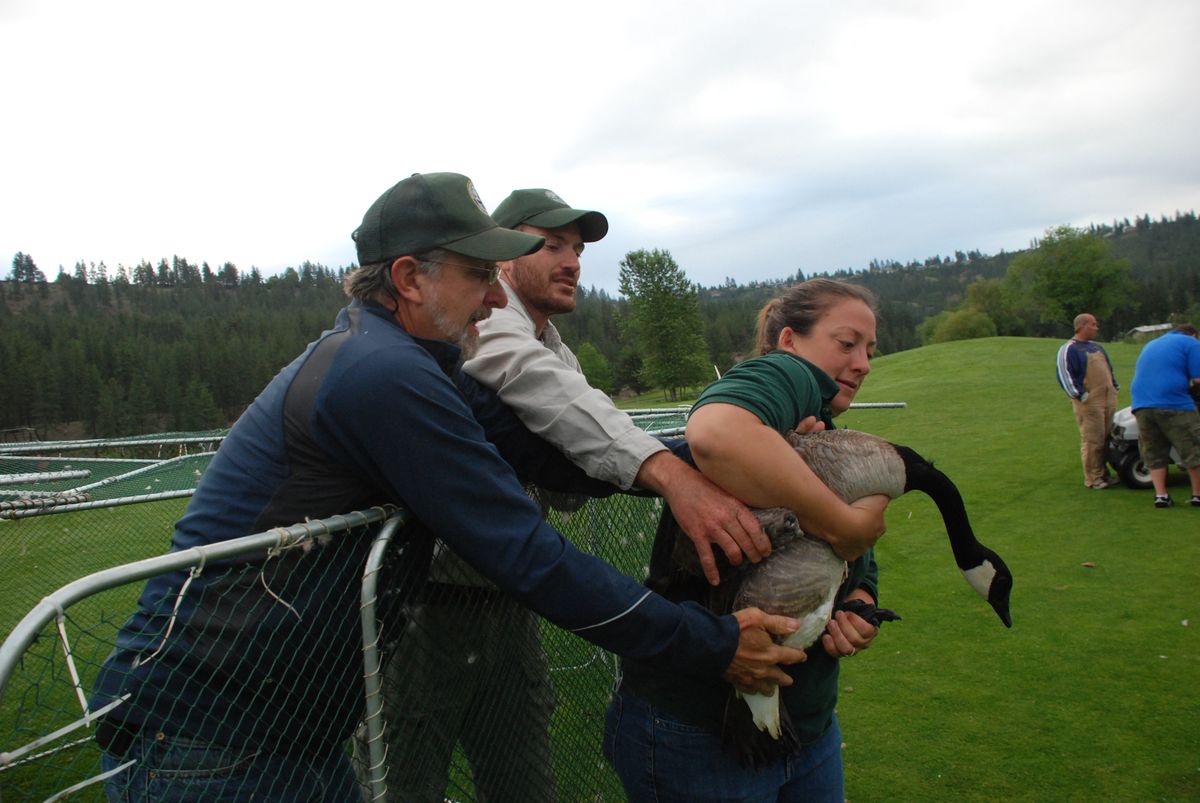Ups and downs for loons, geese, swan
Loon killed, geese banded, swan relishes brood

Washington waterfowl have been keeping an unusually high profile in the news this month.
Among the top recent stories:
Reward for loon killer: The carcass of an adult loon was found at Yocum Lake in Pend Oreille County on Monday after state wildlife officials had received a tip about foul play.
A Colville National Forest staffer searching the shoreline found the dead bird while members of the Loon Lake Loon Association patrolled the shoreline by kayak looking for evidence.
The loons, one of only 10 nesting pairs in northeastern Washington, had produced a chick this spring. The chick is missing but the other adult has been spotted alive, said Dan Poleschook Jr., who’s been studying the region’s loons since the mid 1990s.
The Loon Association has generated a reward fund of $1,000 for information leading to the conviction of anyone who may have harmed the loons.
“This is about the only organization that seems to care enough to stand up to this abuse,” said Red Crass, association president. “Loons are just barely holding on. We don’t want them to disappear.”
Anyone with tips on the incident can all the Washington Poacher Tip Line, (877) WDFW-TIP.
Wild goose roundup: The first golfers out at Qualchan Golf Course Wednesday morning had to play through a disgruntled gaggle of 24 Canada geese and a swarm of volunteers and biologists.
Washington Fish and Wildlife Department researchers made the predawn strike to round up the Qualchan flock so they could be marked with neck bands and leg bands.
Then birds were released to resume feeding and leaving their mark on the green grass on the course along Hangman Creek.
The roundup was timed for a two-week window when adult geese are molting and cannot fly. Using fence panels, the volunteers moved in and formed a corral around the geese, which simply huddled together in a group with their goslings and surrendered.
The study, in its third year around Spokane, seeks to determine if urban geese are learning to avoid guns, predators and long migrations by taking up residence around the green grass of city parks and golf courses.
With three years to go in the study, there’s not enough data yet to define a pattern, said researcher Mikal Moore.
The number of geese nesting in wild areas has been declining in recent years. That has prompted the state to cancel September goose seasons that were designed to crop numbers of citified geese as they venture from towns, Moore said.
On the other hand, urban and suburban geese have been causing a rising number of complaints, indicating that the birds might be shifting to these more protected areas, she said.
Wildlife lovers may like the idea of urban geese, but they can cause a heap of trouble, including the mess they create by defecating – profusely – on lawns and beaches, to the nutrients loading they cause by pooping in ponds and lakes as well as the potential for grouping and spreading disease, Moore said.
But the geese don’t just hatch at local golf courses and live happily ever after.
“We do know from our research that many of the yearling geese from Spokane head to Canada where they are harvested during September hunting seasons in Alberta and Saskatchewan,” Moore said.
The researchers rely on birdwatchers to report numbers on the neck collars that are placed on the adult birds. Waterfowl hunters have a long tradition of assisting researchers by reporting the data on leg bands found on the ducks and geese they harvest.
Senior swan scores: More than 20 years after tending his last brood at Turnbull National Wildlife Refuge and losing his long-time mate to a predator, the refuge’s lone male trumpeter swan, nicknamed Solo, attracted a viable mate this season and found more than love.
Four cygnets hatched on Father’s Day Weekend, no less.
The proud mom, and dad – who’s known to be at least 33 years old – were on the water and inseparable with their offspring this week.
More coverage online, www.spokesman.com/outdoors